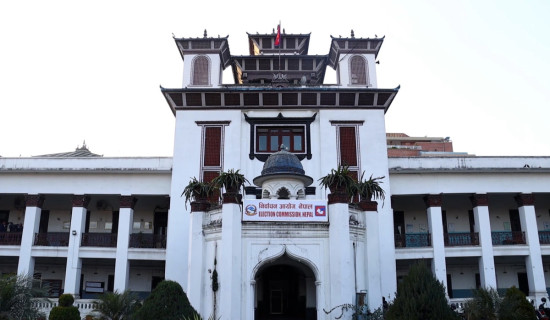- Sunday, 8 February 2026
End Entrenched Social Inequality
One of our basic instincts is that we love being praised and hate being criticised. We are happy when something happens as we wish but are upset if something happens against what we like. We evaluate other people from our own perspectives, allowing only a limited worldview. So, our evaluation is ideologically loaded, value-laden, and lopsided. This seems to be merely a psychological phenomenon. However, the available evidence suggests that this is more sociological than psychological. No matter how much we claim we are neutral to ideology and impartial in judgment, our practice is contrary. We behave as the society instructs us. Social practice is based on unequal power relations between the various social groups.
The reason for such social practice is also obvious. While some people have the power of knowledge, wealth, and state mechanisms, others are deprived of these facilities. In the annals of known human civilisation, powerful people have subjugated the powerless people in several ways – geographical colonisation, economic exploitation, and social oppression.
Western domination
The dominance of powerful people over the powerless is prevalent in almost all corners of the world. But this trend is more common in the West than in the East. The Euro-American powers have been involved in subjugating the powerless for generations. The British colonial powers began their colonisation in America in 1585, which lasted until 1776. Likewise, the British colonisation planted its seeds in 1600, which continued until 1947, and did the same thing in Africa in 1661 until the twentieth century. During those times, there were French and Spanish colonial powers to colonise North and South America. This indicates that the European powers subjugated other people, imposing their political, economic, and cultural supremacy.
Some thinkers have closely studied these human traits, especially those of the Western culture, and written books and articles about the issue. Edward Said in Orientalism (1978), for instance, claims that Western intellectual tradition is Westcentric. For him, orientalism, as we are made to understand, is a hegemonic discourse that indoctrinates the Westerners, ironically some Easterners too, that the Orient is ignorant, the Eastern cultures are inferior, stagnant, and degenerate. These fundamentalist assumptions of Western superiority over Eastern cultures still hold sway. These assumptions, in turn, serve the ruling West-centric powers to perpetuate their hegemonic regime. According to this discourse, Westerners are superior to Easterners in knowledge, civilisation, culture, beauty, and many other aspects. This is how Westerners see the Easterners and behave accordingly.
Not only do the Westerners see the Easterners as inferior, but the latter also see the former as superior in many respects – the Easterners are ignorant, uncivilised, uncultured, and physically repulsive. It seems there is no such thing as equality between the West and the East. Social inequality is prevalent in all parts of the world in one way or the other. Nepal is no exception. When our southern neighbour was decolonised in the mid-twentieth century, political consciousness arose in Nepal and expanded rapidly in no time. Since then, we have been engaged in the fight against feudal as well as other hegemonic powers. Some political forces claim that India has constantly subjugated Nepal, while others counterargue that we are in equal relations. Whatever the case might be, it seems true that we tend to behave as though we are weaker than the Indians in many ways.
Within the territory of Nepal, there are different social groups with unequal power relationships. Those unequal relations are manifested in ethnicity, class, and gender discrimination. The people of high ethnic groups, upper class, and men subjugate the people of low ethnic groups, lower class, and women. Conversely, the latter are submissive to the former. Even after the advent of democracy and the republic, social inequality is still persistent. The constitution has made provisions for the rights of minority groups. There are rules and regulations to enact the state policies. Attempts are being made to provide space for women and minority groups at the local, provincial, and federal level elections. Seats are reserved for government jobs.
Some changes can be seen in quantity, but no substantial changes have occurred in quality. It is thus essential that the powerless groups have to be empowered in all spheres of life – politics, economy, and culture. Legal provisions are important to bring equality, but more importantly, the powerful groups' dominating outlook and the powerless groups' submissive mindset have to change significantly. Unless the powerful groups begin to behave with the powerless groups in a truly democratic way, we cannot expect desirable outcomes. In the same way, marginalised groups cannot be empowered unless they demonstrate a submissive attitude to the dominating groups.
Social disintegration
Still, that is not the whole story. The political actors and social activists are not educating the marginalised groups properly. In the recent past, even some Nepali communist parties advocated for minority ethnic liberation by revolting against the powerful Braman-Chhetry ethnic groups, leaving aside their initial focus on the liberation of working-class people. It is true that complete equality cannot be achieved without mitigating social oppression. However, the shift of focus from class to ethnicity brought about a byproduct of social disintegration instead of eradicating the system of economic exploitation.
Social activism is no better, either. The civil society, including NGOs and CBOs, has not been able to educate the powerless minority groups properly. They are expected to educate them to assume their rights without disintegrating the social order. But they are not doing what they are expected to do. One painful fact is that we want to assume our rights without fulfilling the responsibilities in such sectors as governance and development. Merely demanding the rights be granted and forgetting the responsibilities cannot achieve the goals of social equality. No substantial social change can be expected unless the entire populace internalises the notion that rights and responsibilities are two sides of a coin.
(The author is the chairman of Molung Foundation. bhupadhamala@gmail.com)
















